Business Environment: Iceland Supermarket Analysis Report
VerifiedAdded on 2020/01/07
|16
|4502
|225
Report
AI Summary
This report provides a comprehensive analysis of the business environment surrounding Iceland Supermarket. It begins with an introduction to the business environment and the organizational processes, followed by an examination of the purpose of different types of organizations, specifically comparing Iceland Supermarket to KFC, Cancer Research, and TFL, highlighting their differing objectives and operational strategies. The report then delves into how Iceland Supermarket meets the objectives of various stakeholders, including customers, the government, shareholders, and employees, outlining specific strategies for each group. The report further explores the responsibilities of an organization, such as those related to employees, customers, society, and the environment, and details strategies for fulfilling these responsibilities. The second task of the report examines economic systems, including command, free, and mixed economies, and their impact on resource allocation. It assesses the effects of fiscal and monetary policies on Iceland Supermarket, including interest rates, taxation, and currency exchange rates, and analyzes the influence of regulatory mechanisms and competition policies, such as the Competition Act 2002. The third task explores market structures, including perfect competition, monopolistic competition, oligopoly, and monopoly, and their effects on pricing and output decisions. It also examines how market forces shape Iceland Supermarket's responses and discusses the influence of business and cultural environments on organizational behavior. The fourth task focuses on the significance of international trade to Iceland Supermarket, the impact of global factors on UK business organizations, and the impact of European Union policies on UK business organizations. The report concludes with a summary of the key findings and provides references and an index of tables.
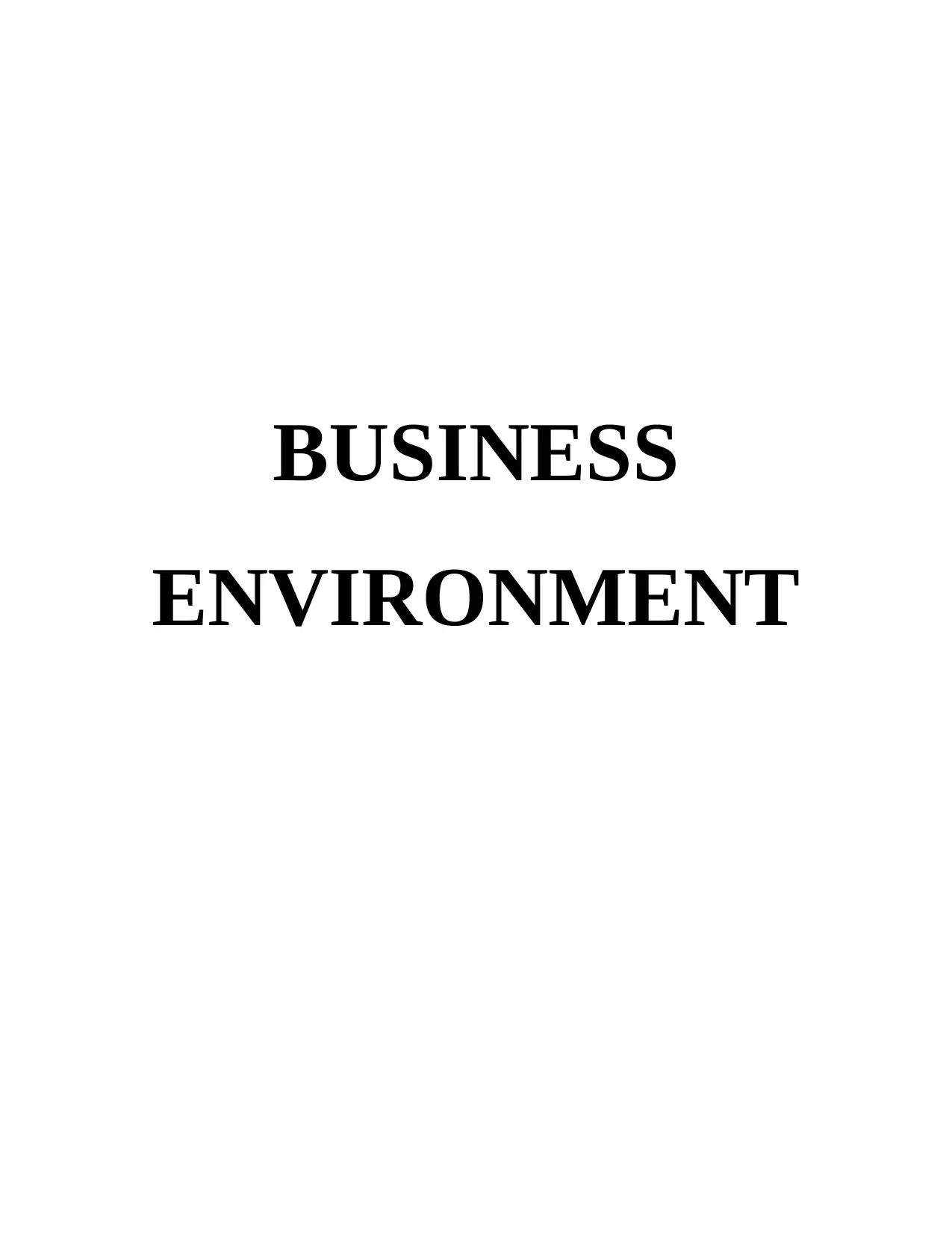
BUSINESS
ENVIRONMENT
ENVIRONMENT
Paraphrase This Document
Need a fresh take? Get an instant paraphrase of this document with our AI Paraphraser
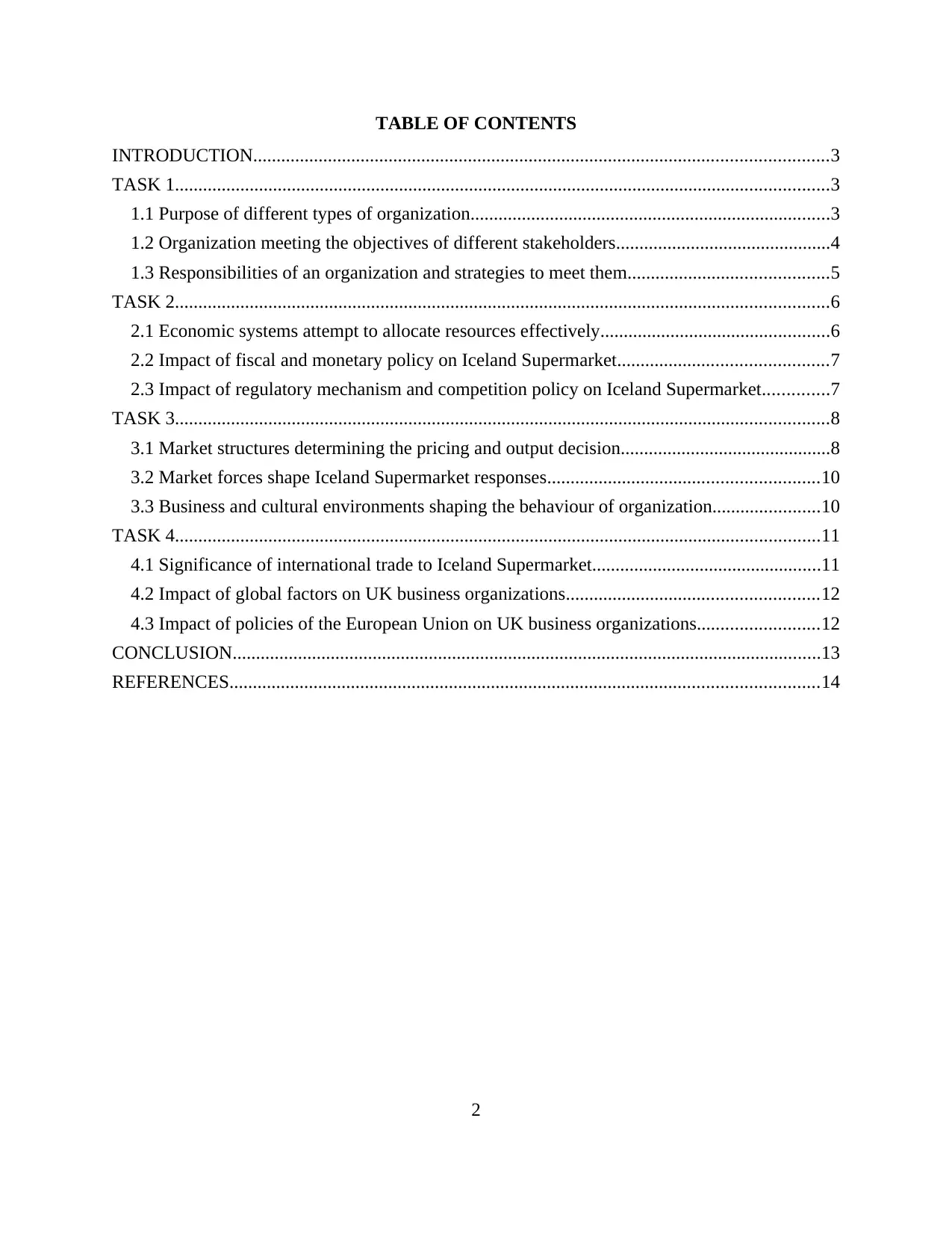
TABLE OF CONTENTS
INTRODUCTION...........................................................................................................................3
TASK 1............................................................................................................................................3
1.1 Purpose of different types of organization.............................................................................3
1.2 Organization meeting the objectives of different stakeholders..............................................4
1.3 Responsibilities of an organization and strategies to meet them...........................................5
TASK 2............................................................................................................................................6
2.1 Economic systems attempt to allocate resources effectively.................................................6
2.2 Impact of fiscal and monetary policy on Iceland Supermarket.............................................7
2.3 Impact of regulatory mechanism and competition policy on Iceland Supermarket..............7
TASK 3............................................................................................................................................8
3.1 Market structures determining the pricing and output decision.............................................8
3.2 Market forces shape Iceland Supermarket responses..........................................................10
3.3 Business and cultural environments shaping the behaviour of organization.......................10
TASK 4..........................................................................................................................................11
4.1 Significance of international trade to Iceland Supermarket.................................................11
4.2 Impact of global factors on UK business organizations......................................................12
4.3 Impact of policies of the European Union on UK business organizations..........................12
CONCLUSION..............................................................................................................................13
REFERENCES..............................................................................................................................14
2
INTRODUCTION...........................................................................................................................3
TASK 1............................................................................................................................................3
1.1 Purpose of different types of organization.............................................................................3
1.2 Organization meeting the objectives of different stakeholders..............................................4
1.3 Responsibilities of an organization and strategies to meet them...........................................5
TASK 2............................................................................................................................................6
2.1 Economic systems attempt to allocate resources effectively.................................................6
2.2 Impact of fiscal and monetary policy on Iceland Supermarket.............................................7
2.3 Impact of regulatory mechanism and competition policy on Iceland Supermarket..............7
TASK 3............................................................................................................................................8
3.1 Market structures determining the pricing and output decision.............................................8
3.2 Market forces shape Iceland Supermarket responses..........................................................10
3.3 Business and cultural environments shaping the behaviour of organization.......................10
TASK 4..........................................................................................................................................11
4.1 Significance of international trade to Iceland Supermarket.................................................11
4.2 Impact of global factors on UK business organizations......................................................12
4.3 Impact of policies of the European Union on UK business organizations..........................12
CONCLUSION..............................................................................................................................13
REFERENCES..............................................................................................................................14
2
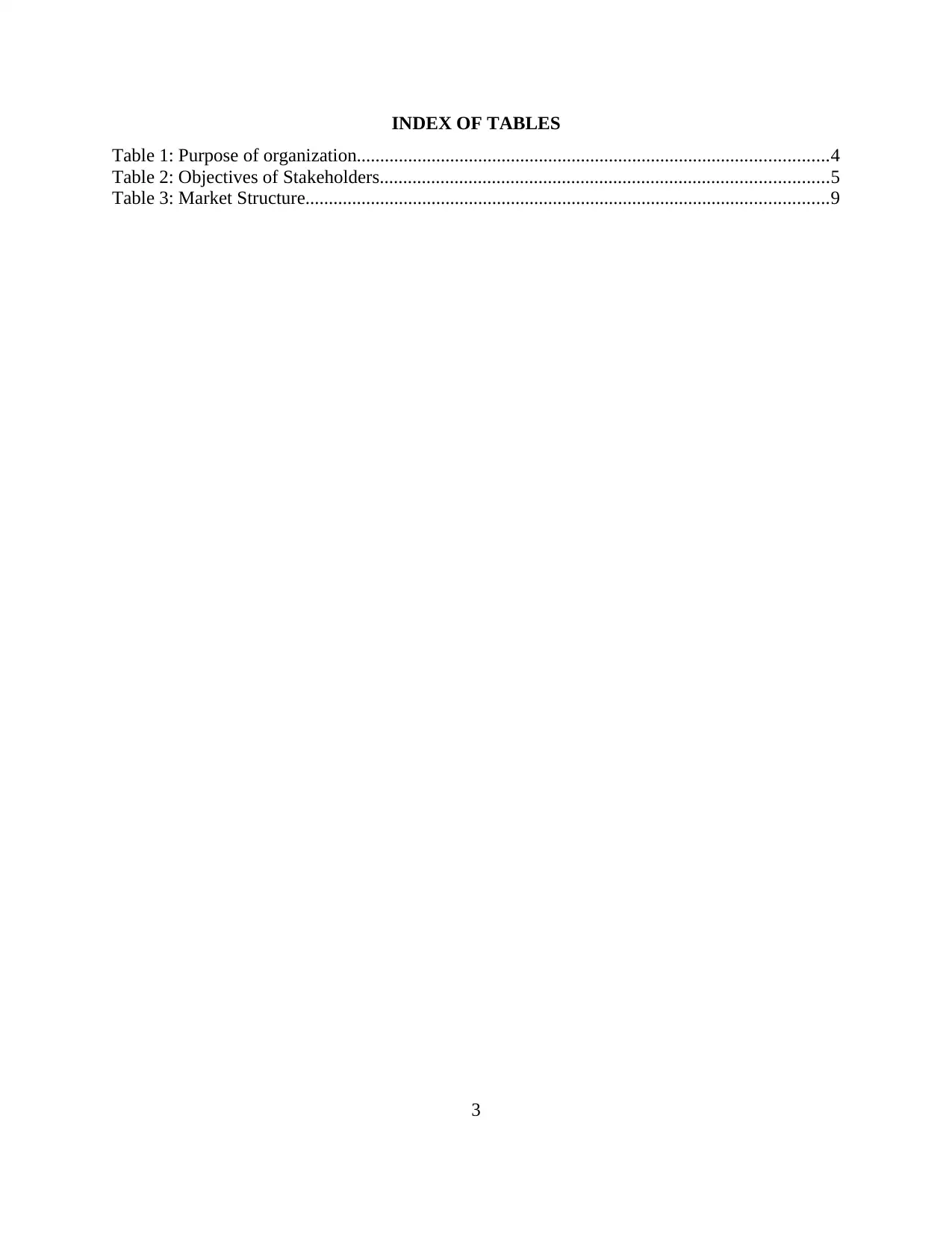
INDEX OF TABLES
Table 1: Purpose of organization.....................................................................................................4
Table 2: Objectives of Stakeholders................................................................................................5
Table 3: Market Structure................................................................................................................9
3
Table 1: Purpose of organization.....................................................................................................4
Table 2: Objectives of Stakeholders................................................................................................5
Table 3: Market Structure................................................................................................................9
3
⊘ This is a preview!⊘
Do you want full access?
Subscribe today to unlock all pages.

Trusted by 1+ million students worldwide
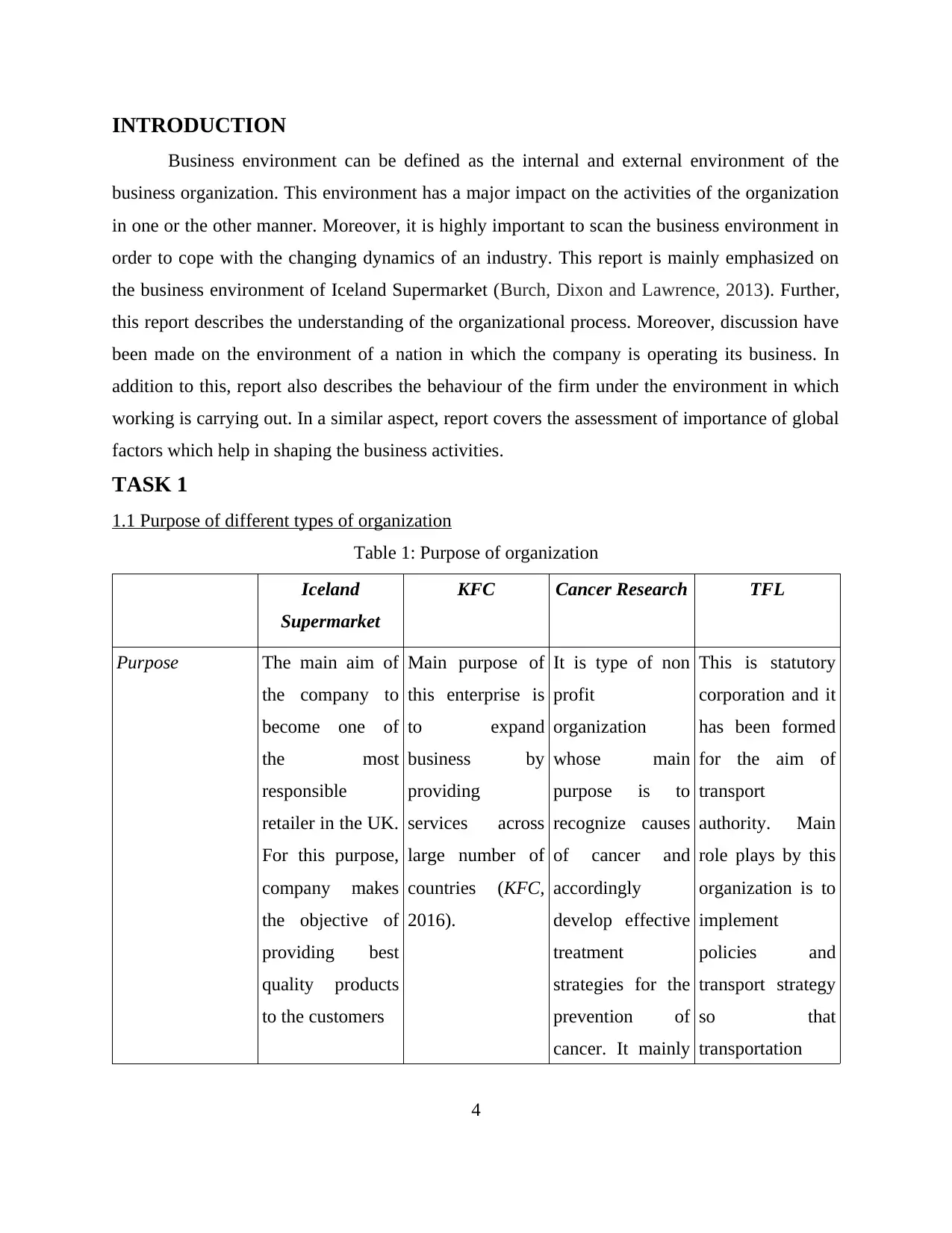
INTRODUCTION
Business environment can be defined as the internal and external environment of the
business organization. This environment has a major impact on the activities of the organization
in one or the other manner. Moreover, it is highly important to scan the business environment in
order to cope with the changing dynamics of an industry. This report is mainly emphasized on
the business environment of Iceland Supermarket (Burch, Dixon and Lawrence, 2013). Further,
this report describes the understanding of the organizational process. Moreover, discussion have
been made on the environment of a nation in which the company is operating its business. In
addition to this, report also describes the behaviour of the firm under the environment in which
working is carrying out. In a similar aspect, report covers the assessment of importance of global
factors which help in shaping the business activities.
TASK 1
1.1 Purpose of different types of organization
Table 1: Purpose of organization
Iceland
Supermarket
KFC Cancer Research TFL
Purpose The main aim of
the company to
become one of
the most
responsible
retailer in the UK.
For this purpose,
company makes
the objective of
providing best
quality products
to the customers
Main purpose of
this enterprise is
to expand
business by
providing
services across
large number of
countries (KFC,
2016).
It is type of non
profit
organization
whose main
purpose is to
recognize causes
of cancer and
accordingly
develop effective
treatment
strategies for the
prevention of
cancer. It mainly
This is statutory
corporation and it
has been formed
for the aim of
transport
authority. Main
role plays by this
organization is to
implement
policies and
transport strategy
so that
transportation
4
Business environment can be defined as the internal and external environment of the
business organization. This environment has a major impact on the activities of the organization
in one or the other manner. Moreover, it is highly important to scan the business environment in
order to cope with the changing dynamics of an industry. This report is mainly emphasized on
the business environment of Iceland Supermarket (Burch, Dixon and Lawrence, 2013). Further,
this report describes the understanding of the organizational process. Moreover, discussion have
been made on the environment of a nation in which the company is operating its business. In
addition to this, report also describes the behaviour of the firm under the environment in which
working is carrying out. In a similar aspect, report covers the assessment of importance of global
factors which help in shaping the business activities.
TASK 1
1.1 Purpose of different types of organization
Table 1: Purpose of organization
Iceland
Supermarket
KFC Cancer Research TFL
Purpose The main aim of
the company to
become one of
the most
responsible
retailer in the UK.
For this purpose,
company makes
the objective of
providing best
quality products
to the customers
Main purpose of
this enterprise is
to expand
business by
providing
services across
large number of
countries (KFC,
2016).
It is type of non
profit
organization
whose main
purpose is to
recognize causes
of cancer and
accordingly
develop effective
treatment
strategies for the
prevention of
cancer. It mainly
This is statutory
corporation and it
has been formed
for the aim of
transport
authority. Main
role plays by this
organization is to
implement
policies and
transport strategy
so that
transportation
4
Paraphrase This Document
Need a fresh take? Get an instant paraphrase of this document with our AI Paraphraser
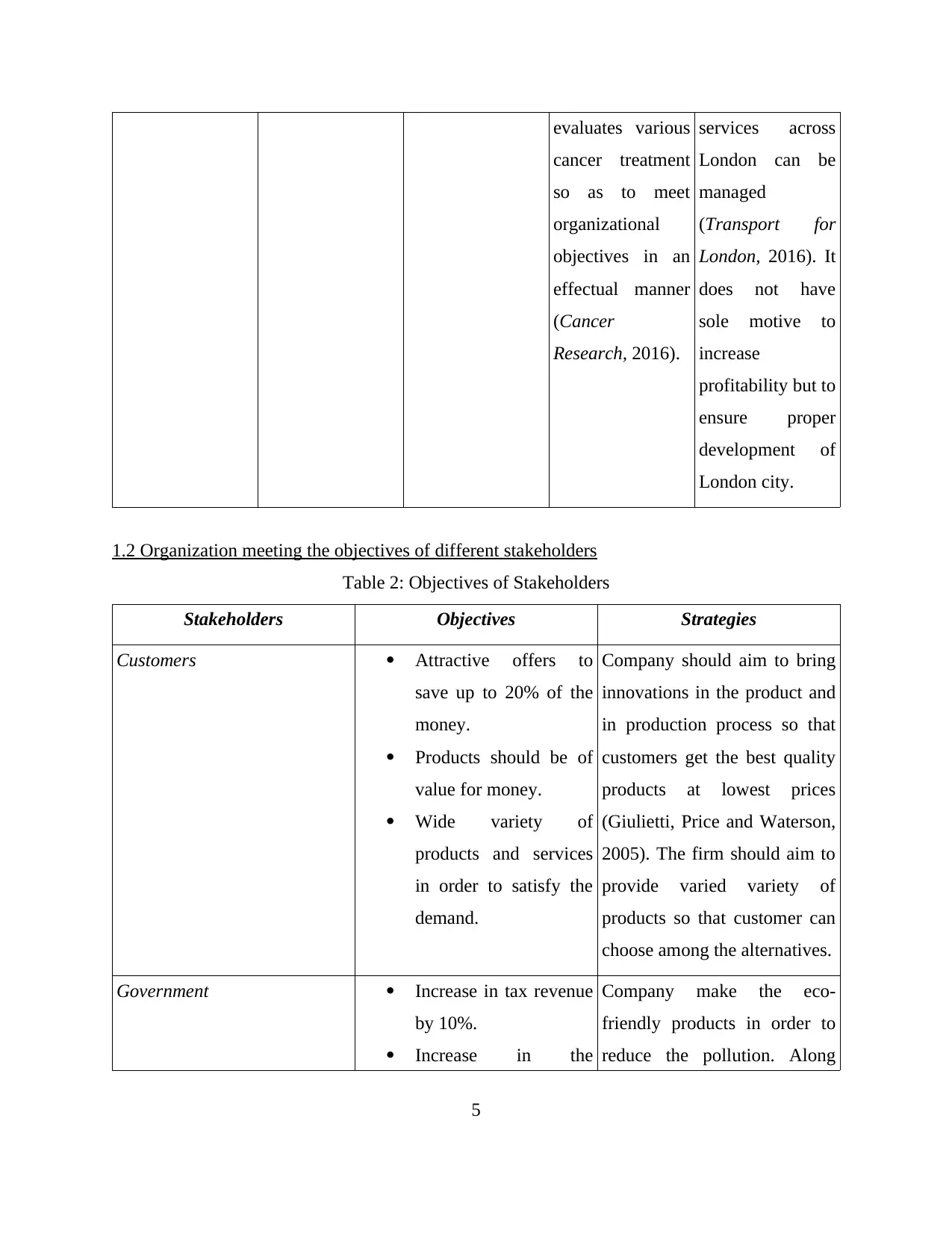
evaluates various
cancer treatment
so as to meet
organizational
objectives in an
effectual manner
(Cancer
Research, 2016).
services across
London can be
managed
(Transport for
London, 2016). It
does not have
sole motive to
increase
profitability but to
ensure proper
development of
London city.
1.2 Organization meeting the objectives of different stakeholders
Table 2: Objectives of Stakeholders
Stakeholders Objectives Strategies
Customers Attractive offers to
save up to 20% of the
money.
Products should be of
value for money.
Wide variety of
products and services
in order to satisfy the
demand.
Company should aim to bring
innovations in the product and
in production process so that
customers get the best quality
products at lowest prices
(Giulietti, Price and Waterson,
2005). The firm should aim to
provide varied variety of
products so that customer can
choose among the alternatives.
Government Increase in tax revenue
by 10%.
Increase in the
Company make the eco-
friendly products in order to
reduce the pollution. Along
5
cancer treatment
so as to meet
organizational
objectives in an
effectual manner
(Cancer
Research, 2016).
services across
London can be
managed
(Transport for
London, 2016). It
does not have
sole motive to
increase
profitability but to
ensure proper
development of
London city.
1.2 Organization meeting the objectives of different stakeholders
Table 2: Objectives of Stakeholders
Stakeholders Objectives Strategies
Customers Attractive offers to
save up to 20% of the
money.
Products should be of
value for money.
Wide variety of
products and services
in order to satisfy the
demand.
Company should aim to bring
innovations in the product and
in production process so that
customers get the best quality
products at lowest prices
(Giulietti, Price and Waterson,
2005). The firm should aim to
provide varied variety of
products so that customer can
choose among the alternatives.
Government Increase in tax revenue
by 10%.
Increase in the
Company make the eco-
friendly products in order to
reduce the pollution. Along
5
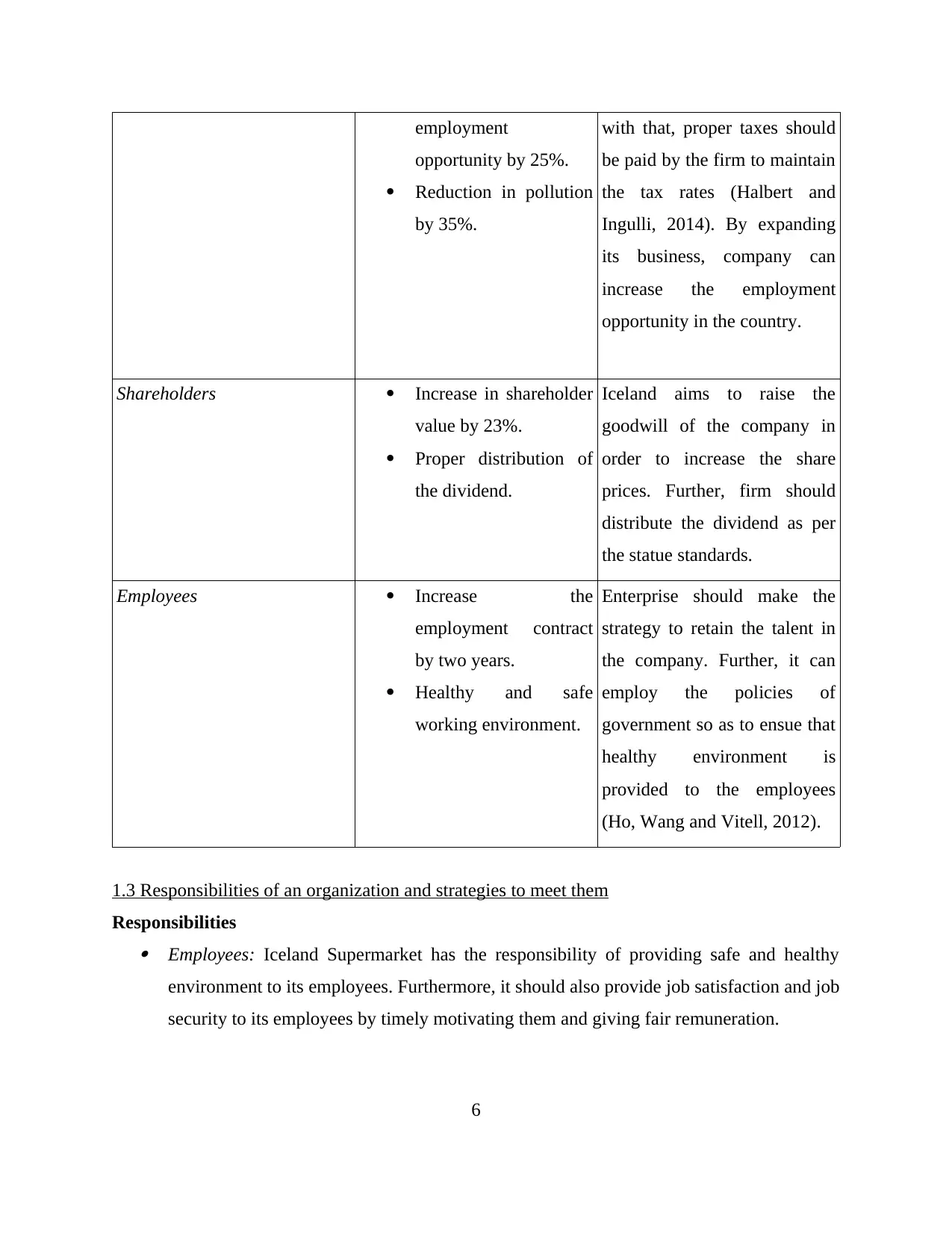
employment
opportunity by 25%.
Reduction in pollution
by 35%.
with that, proper taxes should
be paid by the firm to maintain
the tax rates (Halbert and
Ingulli, 2014). By expanding
its business, company can
increase the employment
opportunity in the country.
Shareholders Increase in shareholder
value by 23%.
Proper distribution of
the dividend.
Iceland aims to raise the
goodwill of the company in
order to increase the share
prices. Further, firm should
distribute the dividend as per
the statue standards.
Employees Increase the
employment contract
by two years.
Healthy and safe
working environment.
Enterprise should make the
strategy to retain the talent in
the company. Further, it can
employ the policies of
government so as to ensue that
healthy environment is
provided to the employees
(Ho, Wang and Vitell, 2012).
1.3 Responsibilities of an organization and strategies to meet them
Responsibilities Employees: Iceland Supermarket has the responsibility of providing safe and healthy
environment to its employees. Furthermore, it should also provide job satisfaction and job
security to its employees by timely motivating them and giving fair remuneration.
6
opportunity by 25%.
Reduction in pollution
by 35%.
with that, proper taxes should
be paid by the firm to maintain
the tax rates (Halbert and
Ingulli, 2014). By expanding
its business, company can
increase the employment
opportunity in the country.
Shareholders Increase in shareholder
value by 23%.
Proper distribution of
the dividend.
Iceland aims to raise the
goodwill of the company in
order to increase the share
prices. Further, firm should
distribute the dividend as per
the statue standards.
Employees Increase the
employment contract
by two years.
Healthy and safe
working environment.
Enterprise should make the
strategy to retain the talent in
the company. Further, it can
employ the policies of
government so as to ensue that
healthy environment is
provided to the employees
(Ho, Wang and Vitell, 2012).
1.3 Responsibilities of an organization and strategies to meet them
Responsibilities Employees: Iceland Supermarket has the responsibility of providing safe and healthy
environment to its employees. Furthermore, it should also provide job satisfaction and job
security to its employees by timely motivating them and giving fair remuneration.
6
⊘ This is a preview!⊘
Do you want full access?
Subscribe today to unlock all pages.

Trusted by 1+ million students worldwide
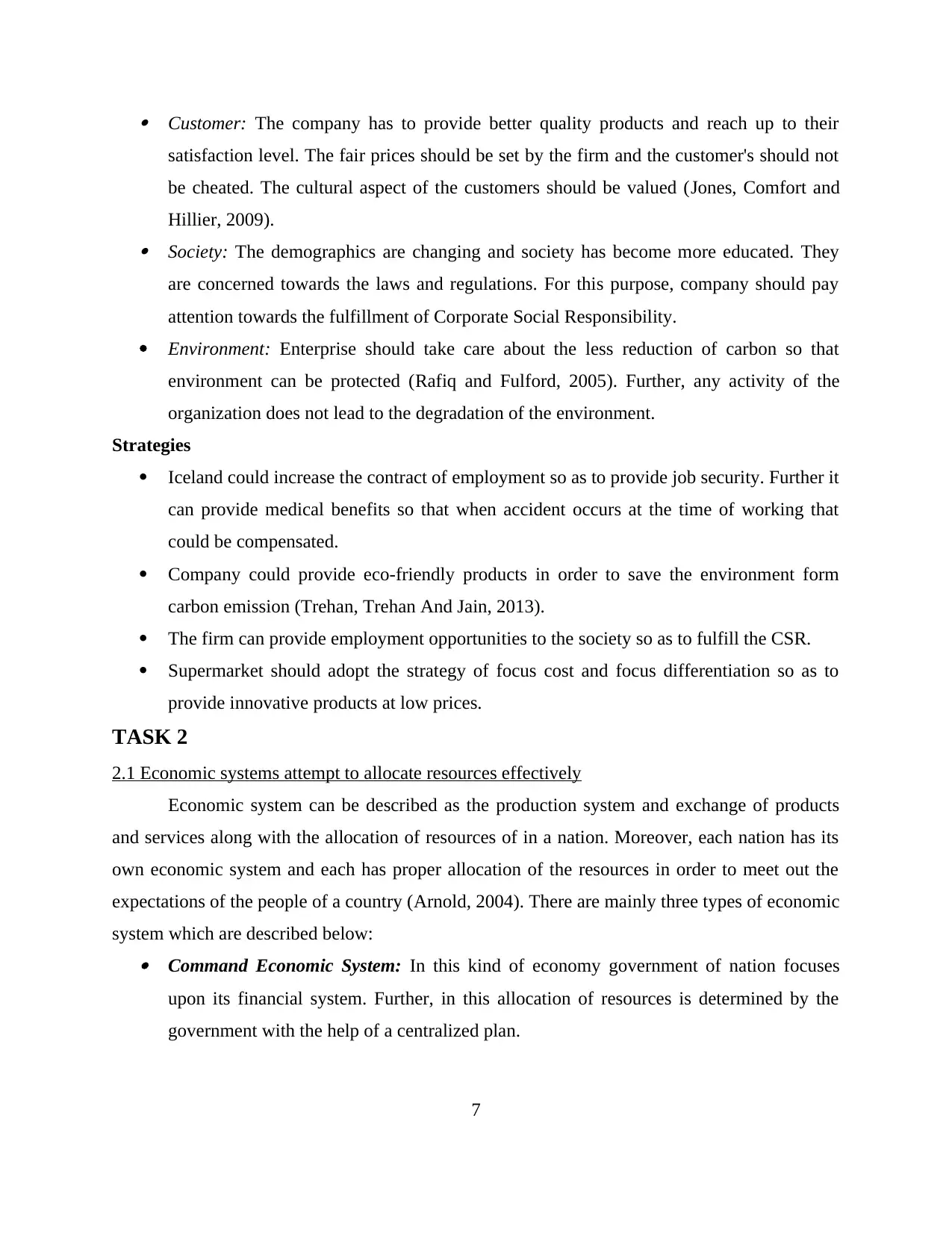
Customer: The company has to provide better quality products and reach up to their
satisfaction level. The fair prices should be set by the firm and the customer's should not
be cheated. The cultural aspect of the customers should be valued (Jones, Comfort and
Hillier, 2009). Society: The demographics are changing and society has become more educated. They
are concerned towards the laws and regulations. For this purpose, company should pay
attention towards the fulfillment of Corporate Social Responsibility.
Environment: Enterprise should take care about the less reduction of carbon so that
environment can be protected (Rafiq and Fulford, 2005). Further, any activity of the
organization does not lead to the degradation of the environment.
Strategies
Iceland could increase the contract of employment so as to provide job security. Further it
can provide medical benefits so that when accident occurs at the time of working that
could be compensated.
Company could provide eco-friendly products in order to save the environment form
carbon emission (Trehan, Trehan And Jain, 2013).
The firm can provide employment opportunities to the society so as to fulfill the CSR.
Supermarket should adopt the strategy of focus cost and focus differentiation so as to
provide innovative products at low prices.
TASK 2
2.1 Economic systems attempt to allocate resources effectively
Economic system can be described as the production system and exchange of products
and services along with the allocation of resources of in a nation. Moreover, each nation has its
own economic system and each has proper allocation of the resources in order to meet out the
expectations of the people of a country (Arnold, 2004). There are mainly three types of economic
system which are described below: Command Economic System: In this kind of economy government of nation focuses
upon its financial system. Further, in this allocation of resources is determined by the
government with the help of a centralized plan.
7
satisfaction level. The fair prices should be set by the firm and the customer's should not
be cheated. The cultural aspect of the customers should be valued (Jones, Comfort and
Hillier, 2009). Society: The demographics are changing and society has become more educated. They
are concerned towards the laws and regulations. For this purpose, company should pay
attention towards the fulfillment of Corporate Social Responsibility.
Environment: Enterprise should take care about the less reduction of carbon so that
environment can be protected (Rafiq and Fulford, 2005). Further, any activity of the
organization does not lead to the degradation of the environment.
Strategies
Iceland could increase the contract of employment so as to provide job security. Further it
can provide medical benefits so that when accident occurs at the time of working that
could be compensated.
Company could provide eco-friendly products in order to save the environment form
carbon emission (Trehan, Trehan And Jain, 2013).
The firm can provide employment opportunities to the society so as to fulfill the CSR.
Supermarket should adopt the strategy of focus cost and focus differentiation so as to
provide innovative products at low prices.
TASK 2
2.1 Economic systems attempt to allocate resources effectively
Economic system can be described as the production system and exchange of products
and services along with the allocation of resources of in a nation. Moreover, each nation has its
own economic system and each has proper allocation of the resources in order to meet out the
expectations of the people of a country (Arnold, 2004). There are mainly three types of economic
system which are described below: Command Economic System: In this kind of economy government of nation focuses
upon its financial system. Further, in this allocation of resources is determined by the
government with the help of a centralized plan.
7
Paraphrase This Document
Need a fresh take? Get an instant paraphrase of this document with our AI Paraphraser
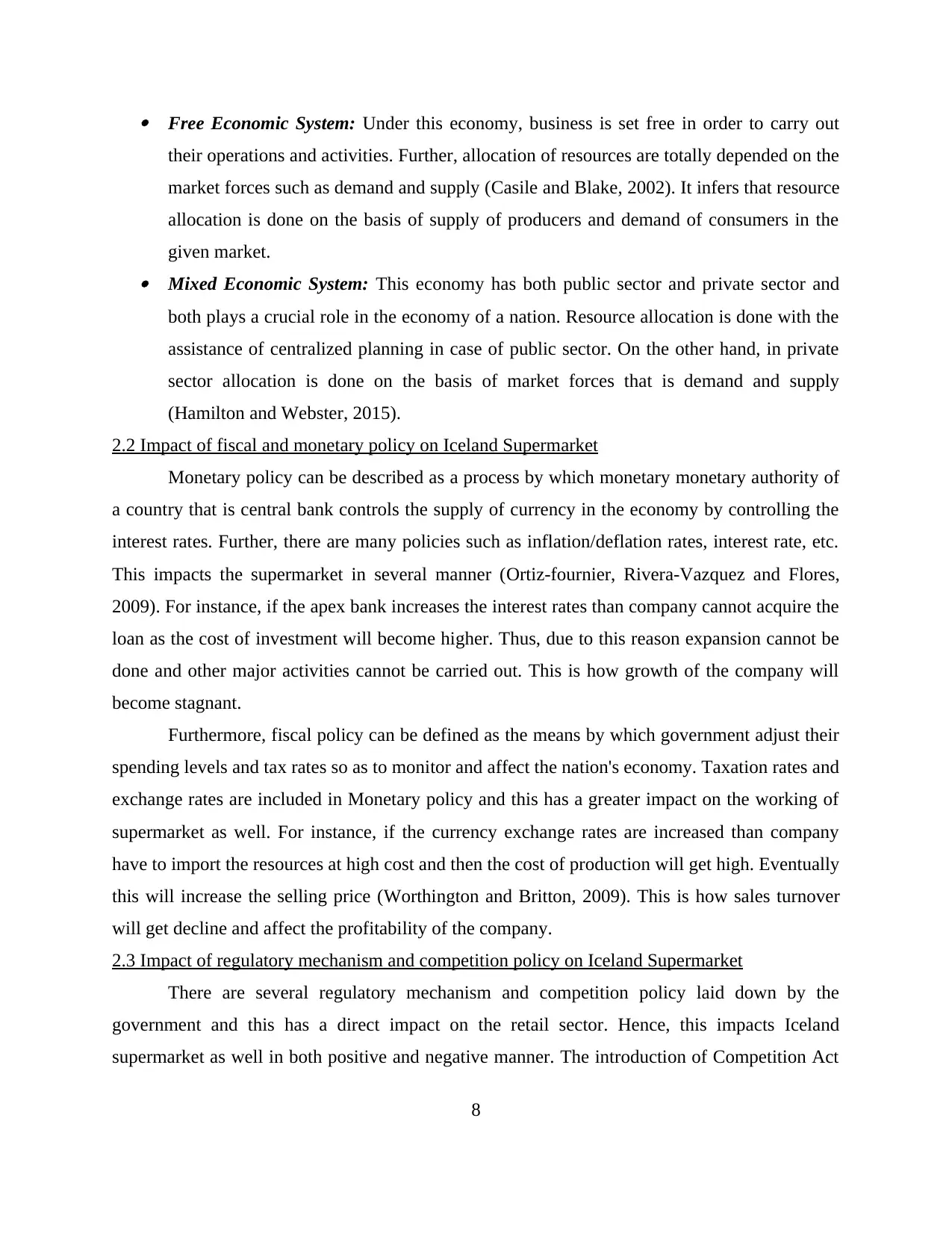
Free Economic System: Under this economy, business is set free in order to carry out
their operations and activities. Further, allocation of resources are totally depended on the
market forces such as demand and supply (Casile and Blake, 2002). It infers that resource
allocation is done on the basis of supply of producers and demand of consumers in the
given market. Mixed Economic System: This economy has both public sector and private sector and
both plays a crucial role in the economy of a nation. Resource allocation is done with the
assistance of centralized planning in case of public sector. On the other hand, in private
sector allocation is done on the basis of market forces that is demand and supply
(Hamilton and Webster, 2015).
2.2 Impact of fiscal and monetary policy on Iceland Supermarket
Monetary policy can be described as a process by which monetary monetary authority of
a country that is central bank controls the supply of currency in the economy by controlling the
interest rates. Further, there are many policies such as inflation/deflation rates, interest rate, etc.
This impacts the supermarket in several manner (Ortiz-fournier, Rivera-Vazquez and Flores,
2009). For instance, if the apex bank increases the interest rates than company cannot acquire the
loan as the cost of investment will become higher. Thus, due to this reason expansion cannot be
done and other major activities cannot be carried out. This is how growth of the company will
become stagnant.
Furthermore, fiscal policy can be defined as the means by which government adjust their
spending levels and tax rates so as to monitor and affect the nation's economy. Taxation rates and
exchange rates are included in Monetary policy and this has a greater impact on the working of
supermarket as well. For instance, if the currency exchange rates are increased than company
have to import the resources at high cost and then the cost of production will get high. Eventually
this will increase the selling price (Worthington and Britton, 2009). This is how sales turnover
will get decline and affect the profitability of the company.
2.3 Impact of regulatory mechanism and competition policy on Iceland Supermarket
There are several regulatory mechanism and competition policy laid down by the
government and this has a direct impact on the retail sector. Hence, this impacts Iceland
supermarket as well in both positive and negative manner. The introduction of Competition Act
8
their operations and activities. Further, allocation of resources are totally depended on the
market forces such as demand and supply (Casile and Blake, 2002). It infers that resource
allocation is done on the basis of supply of producers and demand of consumers in the
given market. Mixed Economic System: This economy has both public sector and private sector and
both plays a crucial role in the economy of a nation. Resource allocation is done with the
assistance of centralized planning in case of public sector. On the other hand, in private
sector allocation is done on the basis of market forces that is demand and supply
(Hamilton and Webster, 2015).
2.2 Impact of fiscal and monetary policy on Iceland Supermarket
Monetary policy can be described as a process by which monetary monetary authority of
a country that is central bank controls the supply of currency in the economy by controlling the
interest rates. Further, there are many policies such as inflation/deflation rates, interest rate, etc.
This impacts the supermarket in several manner (Ortiz-fournier, Rivera-Vazquez and Flores,
2009). For instance, if the apex bank increases the interest rates than company cannot acquire the
loan as the cost of investment will become higher. Thus, due to this reason expansion cannot be
done and other major activities cannot be carried out. This is how growth of the company will
become stagnant.
Furthermore, fiscal policy can be defined as the means by which government adjust their
spending levels and tax rates so as to monitor and affect the nation's economy. Taxation rates and
exchange rates are included in Monetary policy and this has a greater impact on the working of
supermarket as well. For instance, if the currency exchange rates are increased than company
have to import the resources at high cost and then the cost of production will get high. Eventually
this will increase the selling price (Worthington and Britton, 2009). This is how sales turnover
will get decline and affect the profitability of the company.
2.3 Impact of regulatory mechanism and competition policy on Iceland Supermarket
There are several regulatory mechanism and competition policy laid down by the
government and this has a direct impact on the retail sector. Hence, this impacts Iceland
supermarket as well in both positive and negative manner. The introduction of Competition Act
8
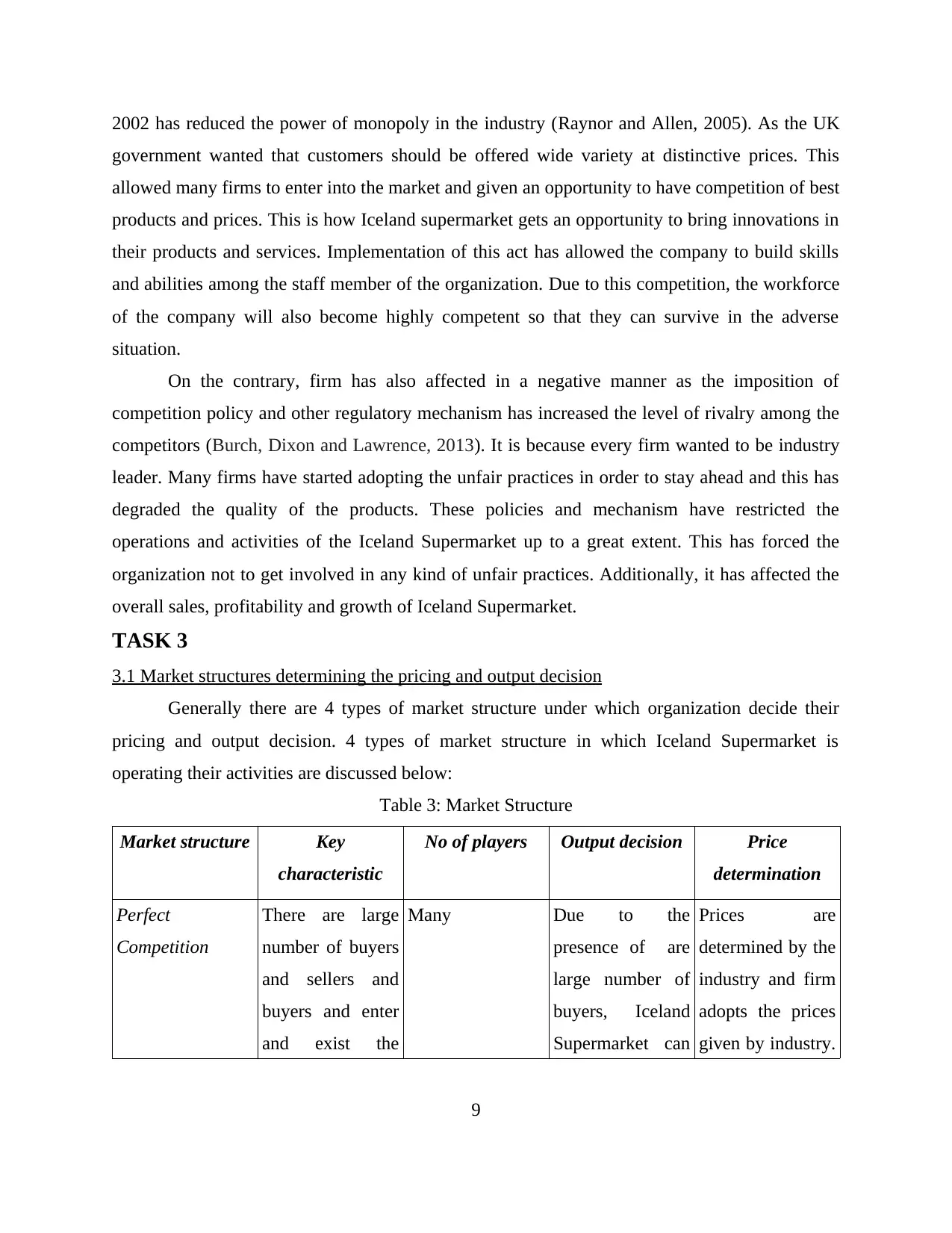
2002 has reduced the power of monopoly in the industry (Raynor and Allen, 2005). As the UK
government wanted that customers should be offered wide variety at distinctive prices. This
allowed many firms to enter into the market and given an opportunity to have competition of best
products and prices. This is how Iceland supermarket gets an opportunity to bring innovations in
their products and services. Implementation of this act has allowed the company to build skills
and abilities among the staff member of the organization. Due to this competition, the workforce
of the company will also become highly competent so that they can survive in the adverse
situation.
On the contrary, firm has also affected in a negative manner as the imposition of
competition policy and other regulatory mechanism has increased the level of rivalry among the
competitors (Burch, Dixon and Lawrence, 2013). It is because every firm wanted to be industry
leader. Many firms have started adopting the unfair practices in order to stay ahead and this has
degraded the quality of the products. These policies and mechanism have restricted the
operations and activities of the Iceland Supermarket up to a great extent. This has forced the
organization not to get involved in any kind of unfair practices. Additionally, it has affected the
overall sales, profitability and growth of Iceland Supermarket.
TASK 3
3.1 Market structures determining the pricing and output decision
Generally there are 4 types of market structure under which organization decide their
pricing and output decision. 4 types of market structure in which Iceland Supermarket is
operating their activities are discussed below:
Table 3: Market Structure
Market structure Key
characteristic
No of players Output decision Price
determination
Perfect
Competition
There are large
number of buyers
and sellers and
buyers and enter
and exist the
Many Due to the
presence of are
large number of
buyers, Iceland
Supermarket can
Prices are
determined by the
industry and firm
adopts the prices
given by industry.
9
government wanted that customers should be offered wide variety at distinctive prices. This
allowed many firms to enter into the market and given an opportunity to have competition of best
products and prices. This is how Iceland supermarket gets an opportunity to bring innovations in
their products and services. Implementation of this act has allowed the company to build skills
and abilities among the staff member of the organization. Due to this competition, the workforce
of the company will also become highly competent so that they can survive in the adverse
situation.
On the contrary, firm has also affected in a negative manner as the imposition of
competition policy and other regulatory mechanism has increased the level of rivalry among the
competitors (Burch, Dixon and Lawrence, 2013). It is because every firm wanted to be industry
leader. Many firms have started adopting the unfair practices in order to stay ahead and this has
degraded the quality of the products. These policies and mechanism have restricted the
operations and activities of the Iceland Supermarket up to a great extent. This has forced the
organization not to get involved in any kind of unfair practices. Additionally, it has affected the
overall sales, profitability and growth of Iceland Supermarket.
TASK 3
3.1 Market structures determining the pricing and output decision
Generally there are 4 types of market structure under which organization decide their
pricing and output decision. 4 types of market structure in which Iceland Supermarket is
operating their activities are discussed below:
Table 3: Market Structure
Market structure Key
characteristic
No of players Output decision Price
determination
Perfect
Competition
There are large
number of buyers
and sellers and
buyers and enter
and exist the
Many Due to the
presence of are
large number of
buyers, Iceland
Supermarket can
Prices are
determined by the
industry and firm
adopts the prices
given by industry.
9
⊘ This is a preview!⊘
Do you want full access?
Subscribe today to unlock all pages.

Trusted by 1+ million students worldwide
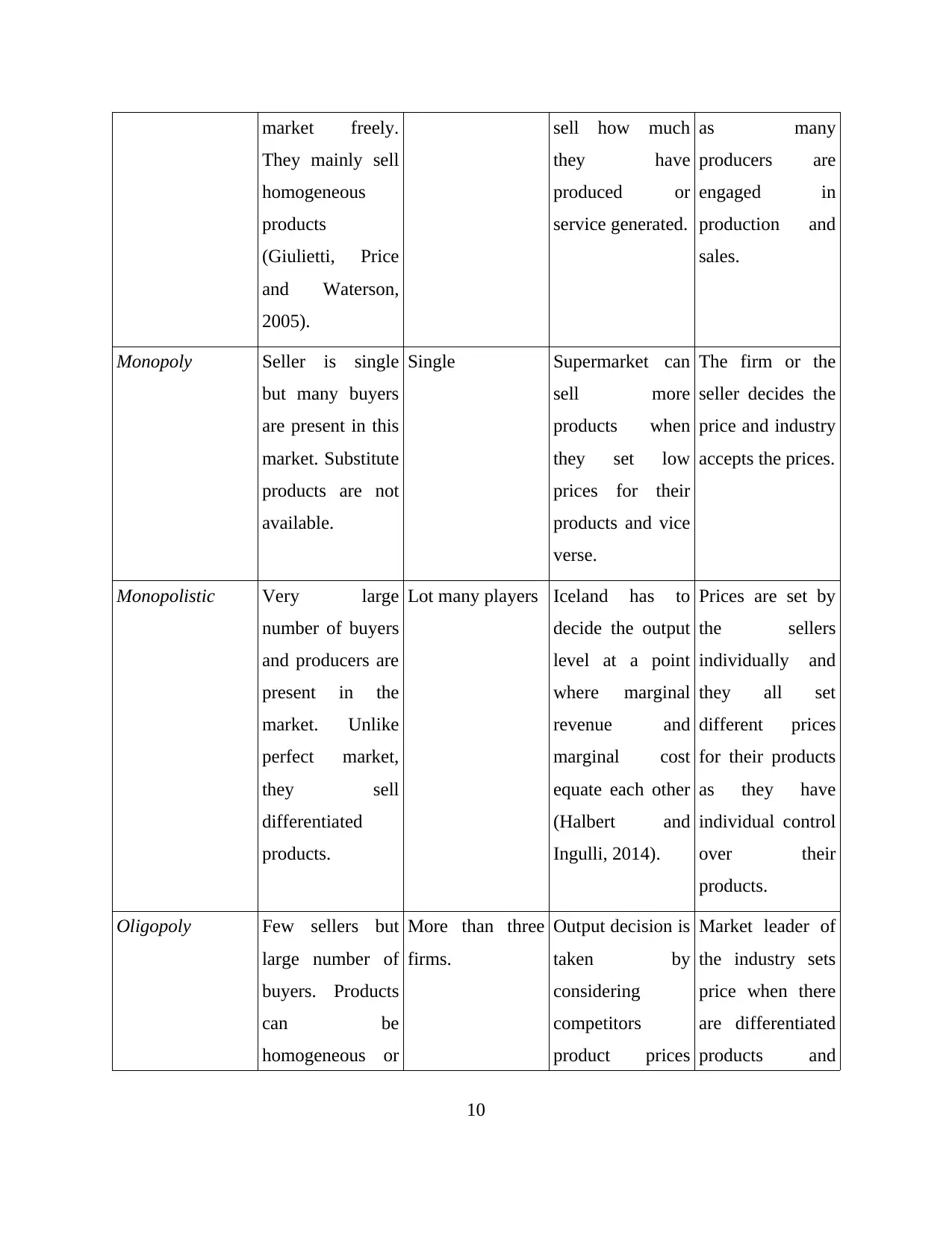
market freely.
They mainly sell
homogeneous
products
(Giulietti, Price
and Waterson,
2005).
sell how much
they have
produced or
service generated.
as many
producers are
engaged in
production and
sales.
Monopoly Seller is single
but many buyers
are present in this
market. Substitute
products are not
available.
Single Supermarket can
sell more
products when
they set low
prices for their
products and vice
verse.
The firm or the
seller decides the
price and industry
accepts the prices.
Monopolistic Very large
number of buyers
and producers are
present in the
market. Unlike
perfect market,
they sell
differentiated
products.
Lot many players Iceland has to
decide the output
level at a point
where marginal
revenue and
marginal cost
equate each other
(Halbert and
Ingulli, 2014).
Prices are set by
the sellers
individually and
they all set
different prices
for their products
as they have
individual control
over their
products.
Oligopoly Few sellers but
large number of
buyers. Products
can be
homogeneous or
More than three
firms.
Output decision is
taken by
considering
competitors
product prices
Market leader of
the industry sets
price when there
are differentiated
products and
10
They mainly sell
homogeneous
products
(Giulietti, Price
and Waterson,
2005).
sell how much
they have
produced or
service generated.
as many
producers are
engaged in
production and
sales.
Monopoly Seller is single
but many buyers
are present in this
market. Substitute
products are not
available.
Single Supermarket can
sell more
products when
they set low
prices for their
products and vice
verse.
The firm or the
seller decides the
price and industry
accepts the prices.
Monopolistic Very large
number of buyers
and producers are
present in the
market. Unlike
perfect market,
they sell
differentiated
products.
Lot many players Iceland has to
decide the output
level at a point
where marginal
revenue and
marginal cost
equate each other
(Halbert and
Ingulli, 2014).
Prices are set by
the sellers
individually and
they all set
different prices
for their products
as they have
individual control
over their
products.
Oligopoly Few sellers but
large number of
buyers. Products
can be
homogeneous or
More than three
firms.
Output decision is
taken by
considering
competitors
product prices
Market leader of
the industry sets
price when there
are differentiated
products and
10
Paraphrase This Document
Need a fresh take? Get an instant paraphrase of this document with our AI Paraphraser
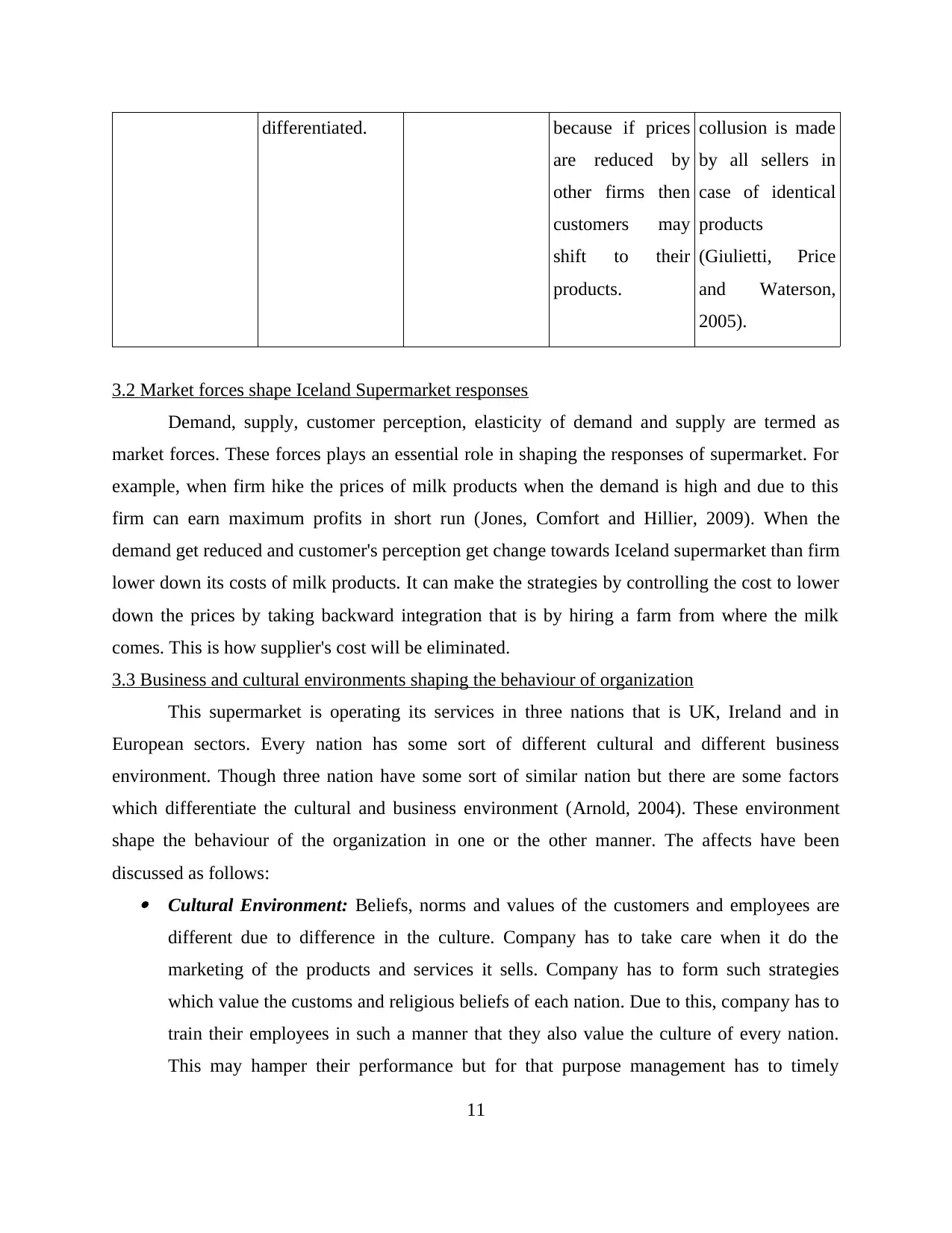
differentiated. because if prices
are reduced by
other firms then
customers may
shift to their
products.
collusion is made
by all sellers in
case of identical
products
(Giulietti, Price
and Waterson,
2005).
3.2 Market forces shape Iceland Supermarket responses
Demand, supply, customer perception, elasticity of demand and supply are termed as
market forces. These forces plays an essential role in shaping the responses of supermarket. For
example, when firm hike the prices of milk products when the demand is high and due to this
firm can earn maximum profits in short run (Jones, Comfort and Hillier, 2009). When the
demand get reduced and customer's perception get change towards Iceland supermarket than firm
lower down its costs of milk products. It can make the strategies by controlling the cost to lower
down the prices by taking backward integration that is by hiring a farm from where the milk
comes. This is how supplier's cost will be eliminated.
3.3 Business and cultural environments shaping the behaviour of organization
This supermarket is operating its services in three nations that is UK, Ireland and in
European sectors. Every nation has some sort of different cultural and different business
environment. Though three nation have some sort of similar nation but there are some factors
which differentiate the cultural and business environment (Arnold, 2004). These environment
shape the behaviour of the organization in one or the other manner. The affects have been
discussed as follows: Cultural Environment: Beliefs, norms and values of the customers and employees are
different due to difference in the culture. Company has to take care when it do the
marketing of the products and services it sells. Company has to form such strategies
which value the customs and religious beliefs of each nation. Due to this, company has to
train their employees in such a manner that they also value the culture of every nation.
This may hamper their performance but for that purpose management has to timely
11
are reduced by
other firms then
customers may
shift to their
products.
collusion is made
by all sellers in
case of identical
products
(Giulietti, Price
and Waterson,
2005).
3.2 Market forces shape Iceland Supermarket responses
Demand, supply, customer perception, elasticity of demand and supply are termed as
market forces. These forces plays an essential role in shaping the responses of supermarket. For
example, when firm hike the prices of milk products when the demand is high and due to this
firm can earn maximum profits in short run (Jones, Comfort and Hillier, 2009). When the
demand get reduced and customer's perception get change towards Iceland supermarket than firm
lower down its costs of milk products. It can make the strategies by controlling the cost to lower
down the prices by taking backward integration that is by hiring a farm from where the milk
comes. This is how supplier's cost will be eliminated.
3.3 Business and cultural environments shaping the behaviour of organization
This supermarket is operating its services in three nations that is UK, Ireland and in
European sectors. Every nation has some sort of different cultural and different business
environment. Though three nation have some sort of similar nation but there are some factors
which differentiate the cultural and business environment (Arnold, 2004). These environment
shape the behaviour of the organization in one or the other manner. The affects have been
discussed as follows: Cultural Environment: Beliefs, norms and values of the customers and employees are
different due to difference in the culture. Company has to take care when it do the
marketing of the products and services it sells. Company has to form such strategies
which value the customs and religious beliefs of each nation. Due to this, company has to
train their employees in such a manner that they also value the culture of every nation.
This may hamper their performance but for that purpose management has to timely
11
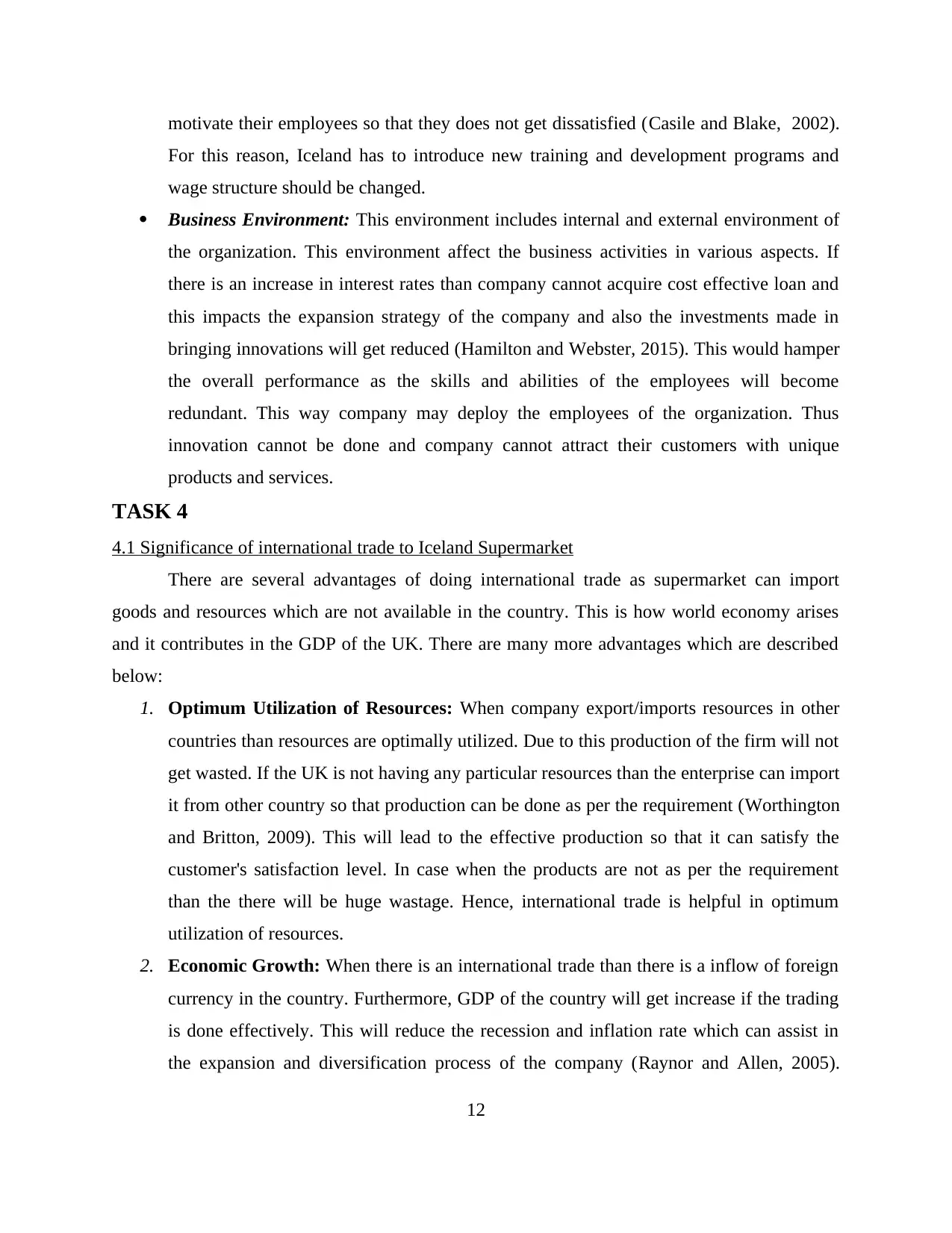
motivate their employees so that they does not get dissatisfied (Casile and Blake, 2002).
For this reason, Iceland has to introduce new training and development programs and
wage structure should be changed.
Business Environment: This environment includes internal and external environment of
the organization. This environment affect the business activities in various aspects. If
there is an increase in interest rates than company cannot acquire cost effective loan and
this impacts the expansion strategy of the company and also the investments made in
bringing innovations will get reduced (Hamilton and Webster, 2015). This would hamper
the overall performance as the skills and abilities of the employees will become
redundant. This way company may deploy the employees of the organization. Thus
innovation cannot be done and company cannot attract their customers with unique
products and services.
TASK 4
4.1 Significance of international trade to Iceland Supermarket
There are several advantages of doing international trade as supermarket can import
goods and resources which are not available in the country. This is how world economy arises
and it contributes in the GDP of the UK. There are many more advantages which are described
below:
1. Optimum Utilization of Resources: When company export/imports resources in other
countries than resources are optimally utilized. Due to this production of the firm will not
get wasted. If the UK is not having any particular resources than the enterprise can import
it from other country so that production can be done as per the requirement (Worthington
and Britton, 2009). This will lead to the effective production so that it can satisfy the
customer's satisfaction level. In case when the products are not as per the requirement
than the there will be huge wastage. Hence, international trade is helpful in optimum
utilization of resources.
2. Economic Growth: When there is an international trade than there is a inflow of foreign
currency in the country. Furthermore, GDP of the country will get increase if the trading
is done effectively. This will reduce the recession and inflation rate which can assist in
the expansion and diversification process of the company (Raynor and Allen, 2005).
12
For this reason, Iceland has to introduce new training and development programs and
wage structure should be changed.
Business Environment: This environment includes internal and external environment of
the organization. This environment affect the business activities in various aspects. If
there is an increase in interest rates than company cannot acquire cost effective loan and
this impacts the expansion strategy of the company and also the investments made in
bringing innovations will get reduced (Hamilton and Webster, 2015). This would hamper
the overall performance as the skills and abilities of the employees will become
redundant. This way company may deploy the employees of the organization. Thus
innovation cannot be done and company cannot attract their customers with unique
products and services.
TASK 4
4.1 Significance of international trade to Iceland Supermarket
There are several advantages of doing international trade as supermarket can import
goods and resources which are not available in the country. This is how world economy arises
and it contributes in the GDP of the UK. There are many more advantages which are described
below:
1. Optimum Utilization of Resources: When company export/imports resources in other
countries than resources are optimally utilized. Due to this production of the firm will not
get wasted. If the UK is not having any particular resources than the enterprise can import
it from other country so that production can be done as per the requirement (Worthington
and Britton, 2009). This will lead to the effective production so that it can satisfy the
customer's satisfaction level. In case when the products are not as per the requirement
than the there will be huge wastage. Hence, international trade is helpful in optimum
utilization of resources.
2. Economic Growth: When there is an international trade than there is a inflow of foreign
currency in the country. Furthermore, GDP of the country will get increase if the trading
is done effectively. This will reduce the recession and inflation rate which can assist in
the expansion and diversification process of the company (Raynor and Allen, 2005).
12
⊘ This is a preview!⊘
Do you want full access?
Subscribe today to unlock all pages.

Trusted by 1+ million students worldwide
1 out of 16
Related Documents
Your All-in-One AI-Powered Toolkit for Academic Success.
+13062052269
info@desklib.com
Available 24*7 on WhatsApp / Email
![[object Object]](/_next/static/media/star-bottom.7253800d.svg)
Unlock your academic potential
Copyright © 2020–2025 A2Z Services. All Rights Reserved. Developed and managed by ZUCOL.





